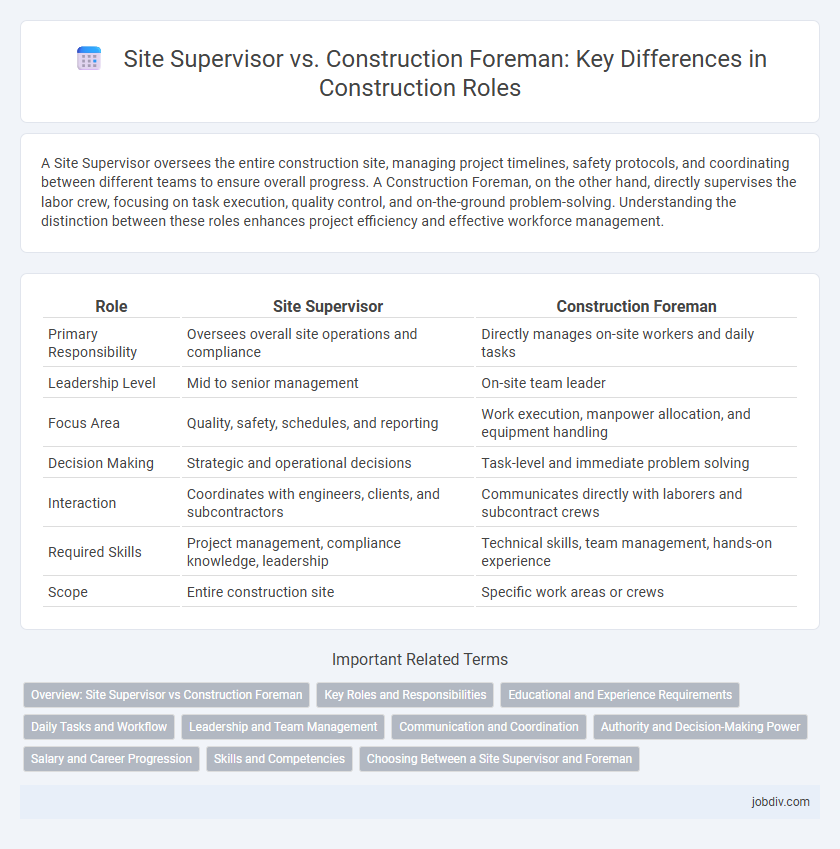A Site Supervisor oversees the entire construction site, managing project timelines, safety protocols, and coordinating between different teams to ensure overall progress. A Construction Foreman, on the other hand, directly supervises the labor crew, focusing on task execution, quality control, and on-the-ground problem-solving. Understanding the distinction between these roles enhances project efficiency and effective workforce management.
Table of Comparison
| Role | Site Supervisor | Construction Foreman |
|---|---|---|
| Primary Responsibility | Oversees overall site operations and compliance | Directly manages on-site workers and daily tasks |
| Leadership Level | Mid to senior management | On-site team leader |
| Focus Area | Quality, safety, schedules, and reporting | Work execution, manpower allocation, and equipment handling |
| Decision Making | Strategic and operational decisions | Task-level and immediate problem solving |
| Interaction | Coordinates with engineers, clients, and subcontractors | Communicates directly with laborers and subcontract crews |
| Required Skills | Project management, compliance knowledge, leadership | Technical skills, team management, hands-on experience |
| Scope | Entire construction site | Specific work areas or crews |
Overview: Site Supervisor vs Construction Foreman
A Site Supervisor oversees overall construction site operations, ensuring compliance with safety regulations, project specifications, and coordination among trades. The Construction Foreman manages day-to-day labor activities, directly supervising workers and maintaining workflow efficiency on the ground. Both roles are critical, with the Site Supervisor focusing on planning and coordination while the Foreman emphasizes execution and team leadership.
Key Roles and Responsibilities
Site Supervisors oversee overall project progress, ensuring compliance with safety regulations and quality standards on-site, while coordinating subcontractors and managing resources efficiently. Construction Foremen primarily manage daily crew activities, directly supervising laborers, assigning specific tasks, and maintaining workflow to meet project deadlines. The Site Supervisor holds broader authority for project execution, whereas the Foreman focuses on hands-on crew leadership and operational control.
Educational and Experience Requirements
Site Supervisors typically require a formal education background such as a diploma or degree in construction management, civil engineering, or a related field, alongside several years of experience in project coordination and site safety compliance. Construction Foremen often possess a high school diploma or trade certificates, with extensive hands-on experience in specific trades and crew management on construction sites. The educational requirements for Site Supervisors emphasize managerial skills and technical knowledge, while Construction Foremen rely primarily on practical expertise and leadership within the workforce.
Daily Tasks and Workflow
Site Supervisors oversee overall project progress, ensuring compliance with safety standards, coordinating subcontractors, and managing resources to maintain workflow efficiency. Construction Foremen focus on directing day-to-day labor activities, assigning specific tasks, monitoring worker performance, and addressing on-site issues to meet project deadlines. Both roles require close communication to align operational tasks with project timelines and quality standards.
Leadership and Team Management
Site Supervisors oversee project execution, ensuring safety compliance and quality control while managing multiple crews and subcontractors. Construction Foremen lead frontline workers directly, focusing on daily task assignments, skill coordination, and immediate problem-solving on-site. Effective leadership in construction requires Site Supervisors to balance strategic oversight with Foremen's hands-on team management to maintain workflow and productivity.
Communication and Coordination
Site supervisors excel in communication by liaising between project managers, subcontractors, and clients to ensure clarity in project goals and timelines. Construction foremen primarily coordinate on-site labor, directing crews and managing daily tasks to maintain workflow efficiency. Effective communication from site supervisors complements the foreman's coordination role, driving project progress and minimizing delays.
Authority and Decision-Making Power
A Site Supervisor holds higher authority on construction projects, overseeing multiple teams, ensuring compliance with safety standards, and managing overall site operations. The Construction Foreman typically has direct decision-making power over a specific crew or trade, coordinating day-to-day tasks and reporting to the Site Supervisor. While the Site Supervisor makes strategic decisions affecting the entire project, the Foreman focuses on tactical, on-the-ground workforce management.
Salary and Career Progression
Site supervisors typically earn between $55,000 and $80,000 annually, reflecting their broader responsibility for project oversight and compliance, while construction foremen generally make around $45,000 to $70,000, focusing more on direct labor management. Career progression for site supervisors often leads to project management or construction management roles with increased strategic responsibilities and higher salaries exceeding $90,000. Foremen may advance to site supervisor positions through experience and leadership development, but their salary growth tends to be more gradual compared to the supervisor track.
Skills and Competencies
Site Supervisors exhibit strong project management skills, including scheduling, resource allocation, and safety compliance, ensuring overall site coordination and adherence to regulations. Construction Foremen demonstrate hands-on expertise in labor supervision, equipment operation, and direct task execution, focusing on workforce management and daily activity oversight. Both roles require excellent communication, leadership abilities, and problem-solving skills critical for maintaining workflow efficiency and site safety.
Choosing Between a Site Supervisor and Foreman
Choosing between a Site Supervisor and a Construction Foreman depends on project scale and management needs. A Site Supervisor oversees overall site operations, safety compliance, and coordination between different trades, ensuring project milestones are met. In contrast, a Construction Foreman directly manages labor crews and day-to-day tasks, making them ideal for hands-on leadership on smaller or specialized sites.
Site Supervisor vs Construction Foreman Infographic

 jobdiv.com
jobdiv.com